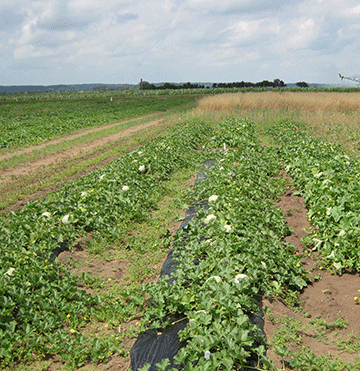By Ajay Nair
Few fruits are more refreshing on a warm summer day than melon. Melon production in Iowa has expanded in recent years, with more than 200 acres of watermelon, muskmelon and honeydew growing in the state in 2012.

Iowa is home to the famous Muscatine melons which are sought out because of their unique flavor and aroma thanks to sandy soil that produces ideal growing conditions in the eastern part of the state.
The production of melon, from site selection and planting to harvesting, is covered in the new Iowa State University Extension and Outreach publication ‘Commercial Melon Production’ (HORT 3058). The publication, written by Ajay Nair, assistant professor of horticulture and extension vegetable specialist at Iowa State University, and John Krzton-Presson, graduate student in the Department of Horticulture at Iowa State, is available online through the Extension Store.
“Melons are one of the staples when it comes to foods that make us think of the summer, especially if the melons are from Muscatine,” Nair said. “In Muscatine, perfect soil and weather conditions all come together to produce a the melon that we crave. Melons are an Iowa ingredient, similar to sweet corn that is enjoyed during the summer as well.”
The publication focuses on the three different types of melons: muskmelon, watermelon and honeydew. The fruit favors warm weather, preferring growing temperatures that range from 85-90°F.
“Muskmelon and watermelon are established crops in Iowa but honeydew is increasing its share of the state’s melon crop,” Nair said. “More varieties are also being produced, such as seedless watermelon, which is something many consumers are interested in.”
Melons are being grown in non-traditional ways, such as in strip tillage production using cereal rye as a cover crop. The thick mat of rye provides weed suppression while also reducing the need for herbicides.
“We really want to bring sustainable production techniques to the attention of growers,” Nair said. “Having melons in a strip till system keeps the melons clean which means there is less chance of them rotting and less cleaning that needs to be done, leading to a higher quality product.”
The publication also discusses different cultivars of honeydew and muskmelon, highlighting ones that have performed well in Iowa State University research field trials.
Information on fertilization, weed management and proper irrigation are also discussed. Common insect pests and techniques for limiting their impact on the melon crop is included in the publication.
Source:iastate.edu